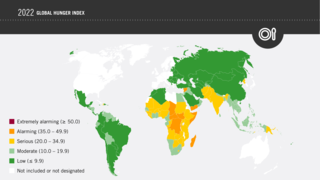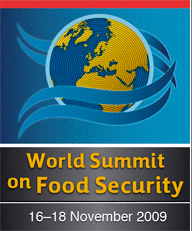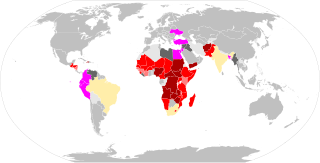
Extreme poverty is the most severe type of poverty, defined by the United Nations (UN) as "a condition characterized by severe deprivation of basic human needs, including food, safe drinking water, sanitation facilities, health, shelter, education and information. It depends not only on income but also on access to services". Historically, other definitions have been proposed within the United Nations.

The Food and Agriculture Organization of the United Nations (FAO) is a specialized agency of the United Nations that leads international efforts to defeat hunger and improve nutrition and food security. Its Latin motto, fiat panis, translates to "let there be bread". It was founded on 16 October 1945.

The World Food Programme (WFP) is an international organization within the United Nations that provides food assistance worldwide. It is the world's largest humanitarian organization and the leading provider of school meals. Founded in 1961, WFP is headquartered in Rome and has offices in 80 countries. As of 2021, it supported over 128 million people across more than 120 countries and territories.

In politics, humanitarian aid, and the social sciences, hunger is defined as a condition in which a person does not have the physical or financial capability to eat sufficient food to meet basic nutritional needs for a sustained period. In the field of hunger relief, the term hunger is used in a sense that goes beyond the common desire for food that all humans experience, also known as an appetite. The most extreme form of hunger, when malnutrition is widespread, and when people have started dying of starvation through lack of access to sufficient, nutritious food, leads to a declaration of famine.

Food security is the state of having reliable access to a sufficient quantity of affordable, nutritious food. The availability of food for people of any class, gender or religion is another element of food security. Similarly, household food security is considered to exist when all the members of a family, at all times, have access to enough food for an active, healthy life. Individuals who are food-secure do not live in hunger or fear of starvation. Food security includes resilience to future disruptions of food supply. Such a disruption could occur due to various risk factors such as droughts and floods, shipping disruptions, fuel shortages, economic instability, and wars. Food insecurity is the opposite of food security: a state where there is only limited or uncertain availability of suitable food.

Malnutrition occurs when an organism gets too few or too many nutrients, resulting in health problems. Specifically, it is "a deficiency, excess, or imbalance of energy, protein and other nutrients" which adversely affects the body's tissues and form. Malnutrition is not receiving the correct amount of nutrition.

International development or global development is a broad concept denoting the idea that societies and countries have differing levels of economic or human development on an international scale. It is the basis for international classifications such as developed country, developing country and least developed country, and for a field of practice and research that in various ways engages with international development processes. There are, however, many schools of thought and conventions regarding which are the exact features constituting the "development" of a country.
The Hunger Project (THP), founded in 1977 with the stated goal of ending world hunger in 25 years, is an organization committed to the sustainable end of world hunger. It has ongoing programs in Africa, Asia, and Latin America, where it implements programs aimed at mobilizing rural grassroots communities to achieve sustainable progress in health, education, nutrition, and family income. THP is a 501(c)(3) non-profit charitable organization incorporated in the state of California.

In the United Nations, the Millennium Development Goals (MDGs) were eight international development goals for the year 2015 created following the Millennium Summit, following the adoption of the United Nations Millennium Declaration. These were based on the OECD DAC International Development Goals agreed by Development Ministers in the "Shaping the 21st Century Strategy". The Sustainable Development Goals (SDGs) succeeded the MDGs in 2016.

Lauren Bush Lauren is the CEO and co-founder of FEED Projects. She is also known for her previous career as a fashion model and designer. She is the daughter of Neil Bush and Sharon Bush, granddaughter of former U.S. president George H. W. Bush, and niece of former U.S. president George W. Bush and former Florida governor Jeb Bush.
The Committee of 19 is a committee of students at Auburn University that direct the War on Hunger efforts on campus and in the local community. In 2004, Auburn University was chosen by the World Food Programme, an agency of the United Nations and the largest humanitarian organization in the world, to lead the first student-led efforts in the War on Hunger. The number 19 in the title is symbolic of the 19 cents per day that it takes the World Food Programme to feed a hungry child in the developing world. Today, that number is estimated to be closer to twenty-five cents. There are currently 22 members on the Committee of 19, representing various student organizations and the university's colleges and schools.

Josette Sheeran is an American non-profit executive and diplomat who served in the United States Department of State. Sheeran serves as the seventh president and CEO of Asia Society since June 10, 2013. Sheeran was also the United Nations's Special Envoy for Haiti.
Fill the Cup is a campaign of the United Nations World Food Programme (WFP), the world's largest humanitarian aid agency. In 2009, WFP plans to feed over 100 million people in 77 of the world's poorest countries. "Fill the Cup" aims to use the symbol of the Red Cup to raise awareness of global hunger, specifically involving hungry school children. About 59 million primary school age children attend school hungry across the developing world, with 23 million of them in 45 African countries.

The Global Hunger Index (GHI) is a tool that attempts to measure and track hunger globally as well as by region and by country, prepared by European NGOs of Concern Worldwide and Welthungerhilfe. The GHI is calculated annually, and its results appear in a report issued in October each year.

The World Summit on Food Security took place in Rome, Italy between 16 and 18 November 2009. The decision to convene the summit was taken by the Council of the Food and Agriculture Organization of the United Nations (FAO) in June 2009, at the proposal of FAO Director-General Dr Jacques Diouf. Sixty Heads of State and Government and 192 ministers, from 182 countries and the European Community, attended the summit, which took place at FAO's headquarters.

There were 795 million undernourished people in the world in 2014, a decrease of 216 million since 1990, despite the fact that the world already produces enough food to feed everyone—7 billion people—and could feed more than that—12 billion people.
Since 2016, a food insecurity crisis has been ongoing in Yemen which began during the Yemeni Civil War. The UN estimates that the war has caused an estimated 130,000 deaths from indirect causes which include lack of food, health services, and infrastructure as of December 2020. In 2018, Save the Children estimated that 85,000 children have died due to starvation in the three years prior. In May 2020, UNICEF described Yemen as "the largest humanitarian crisis in the world", and estimated that 80% of the population, over 24 million people, were in need of humanitarian assistance. In September 2022, the World Food Programme estimated that 17.4 million Yemenis struggled with food insecurity, and projected that number would increase to 19 million by the end of the year, describing this level of hunger as "unprecedented." The crisis is being compounded by an outbreak of cholera, which resulted in over 3000 deaths between 2015 and mid 2017. While the country is in crisis and multiple regions have been classified as being in IPC Phase 4, an actual classification of famine conditions was averted in 2018 and again in early 2019 due to international relief efforts. In January 2021, two out of 33 regions were classified as IPC 4 while 26 were classified as IPC 3.

In the early months of 2017, parts of South Sudan experienced a famine following several years of instability in the country's food supply caused by war and drought. The famine, largely focused in the northern part of the country, affected an estimated five million people. In May 2017, the famine was officially declared to have weakened to a state of severe food insecurity.

During the COVID-19 pandemic, food insecurity intensified in many places. In the second quarter of 2020, there were multiple warnings of famine later in the year. In an early report, the Nongovernmental Organization (NGO) Oxfam-International talks about "economic devastation" while the lead-author of the UNU-WIDER report compared COVID-19 to a "poverty tsunami". Others talk about "complete destitution", "unprecedented crisis", "natural disaster", "threat of catastrophic global famine". The decision of the WHO on 11 March 2020, to qualify COVID as a pandemic, that is "an epidemic occurring worldwide, or over a very wide area, crossing international boundaries and usually affecting a large number of people" also contributed to building this global-scale disaster narrative.

Sustainable Development Goal 2 aims to achieve "zero hunger". It is one of the 17 Sustainable Development Goals established by the United Nations in 2015. The official wording is: "End hunger, achieve food security and improved nutrition and promote sustainable agriculture". SDG 2 highlights the "complex inter-linkages between food security, nutrition, rural transformation and sustainable agriculture". According to the United Nations, there are around 690 million people who are hungry, which accounts for slightly less than 10 percent of the world population. One in every nine people goes to bed hungry each night, including 20 million people currently at risk of famine in South Sudan, Somalia, Yemen and Nigeria.
















